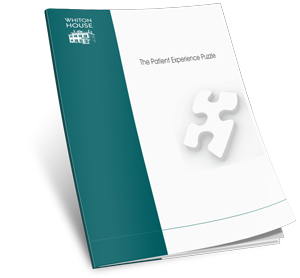Archive for November, 2013:
The Patient Experience Puzzle
Today healthcare is on everyone’s mind. The confluence of policy, politics, demographics and economics has hit an industry that consumes almost 20% of our economy. Healthcare is deeply personal while extraordinarily complex. It is an industry that can produce the most awe-inspiring life saving breakthroughs and still seem out of touch with advances in technology and information management. It touches every facet of our lives.
Download The Patient Experience Puzzle Today!
In short how we deliver, access and pay for healthcare has to and is changing. Most graphs show our healthcare spending rising, syphoning off funds that could be used for other areas of our economy such as education and infrastructure. Yet you ask almost any healthcare provider, and they are struggling to make the financial equation work.
What will drive true breakthrough versus improvement at the margins? There is no single answer to this question – no magic bullet or single piece of legislation – but there must be an alignment between regulations and policies, consumer choice and action, innovators and purchasers. Thousands are engaged and acting on this question, at global, national, state and local levels and from different perspectives.
I am one of those individuals. Twenty-five years ago I began a career in healthcare that spanned different industries, countries and functions. While the work I do now has moved beyond just healthcare, I am committed to being part of the transformation of healthcare. When I founded Whiton House, I started a research project to capture the learning, experiences and knowledge of my career to empower boards and senior leaders to be proactive in what has been an ever-growing focus on the patient experience.
I completed that project and am releasing it here, The Patient Experience Puzzle.
Why is this important? For decades, healthcare lagged behind so many industries in its neglect of studying and managing the patient experience. Saving lives was our calling not mimicking McDonalds.
Today, by and large, the healthcare industry embraces its responsibility and ownership of the experiences it creates. This is good news, as we cannot begin to think about transforming an industry until we become experts at what are we trying to create. But passion and enthusiasm can also be the incubator for groupthink, fads and journeys without vision.
Albert Einstein once said, “We cannot solve our problems with the same thinking we used when we created them.” More than a list of to dos – I hope the questions raised and the framework offered in Patient Experience Puzzle provides a nimble and evolving roadmap that unleashes the creativity and discipline required for breakthroughs in how we design, build and deliver health in the 21st century.
My deepest admiration and thanks goes out to all with whom I have learned from over the last twenty-five years. I look forward to the continuation of this journey.

